Reggae music, rooted in African rhythms and Rastafarian culture, addresses social justice and empowerment through its powerful lyrics. This genre has significantly influenced global popular culture, inspiring various music styles and fostering unity. Artists like Bob Marley have played a crucial role in its worldwide spread, while vibrant festivals celebrate its cultural impact. Reggae’s evolution includes distinct subgenres, each reflecting its rich history and messages of resilience.
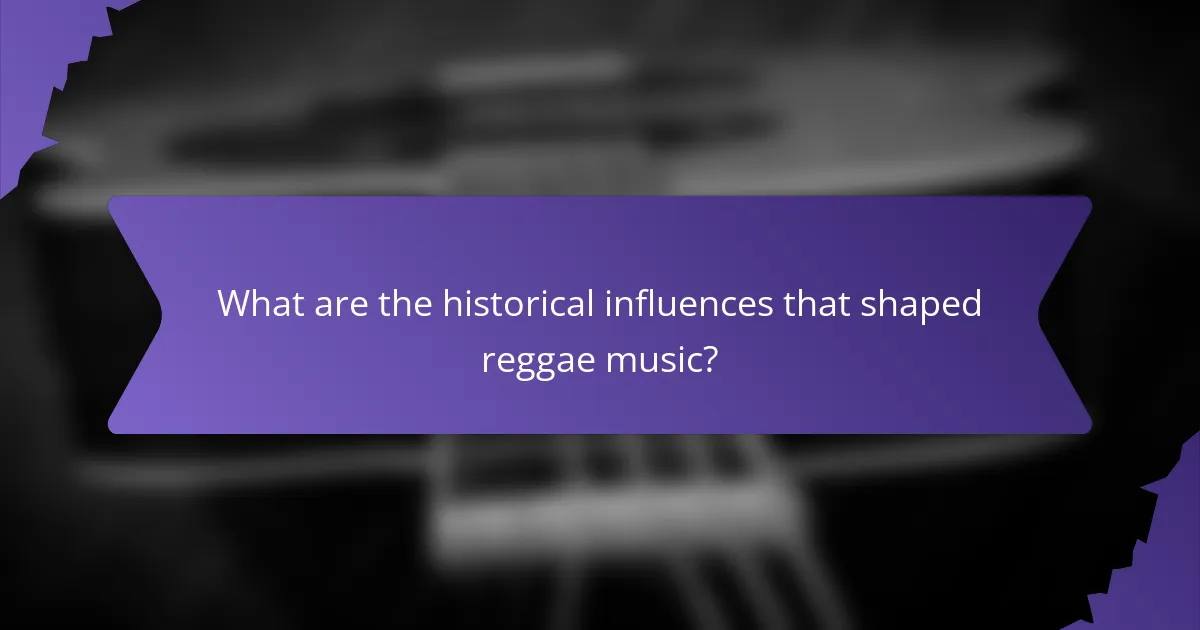
What are the historical influences that shaped reggae music?
Reggae music was shaped by historical influences including African rhythms, Rastafarian culture, and socio-political movements. African musical traditions introduced complex rhythms and instruments, while Rastafarian beliefs infused reggae with themes of spirituality and resistance. Additionally, the social context of Jamaica during the 1960s, marked by economic challenges and political unrest, inspired lyrics that addressed social justice and empowerment. These elements combined to create a genre that resonates globally today.
How did Rastafarian culture contribute to reggae’s development?
Rastafarian culture significantly shaped reggae’s development by infusing it with spiritual themes and social messages. The movement emphasized resistance against oppression and celebrated African heritage, which became central to reggae’s identity. Rastafarian beliefs, such as the veneration of Haile Selassie, influenced lyrical content, promoting messages of unity and empowerment. The use of reggae as a vehicle for political and social commentary helped the genre gain global recognition, bridging cultural gaps and fostering a sense of community among listeners.
What role did socio-political movements play in reggae’s emergence?
Socio-political movements significantly influenced reggae’s emergence by reflecting the struggles and aspirations of marginalized communities. The genre originated in Jamaica during the 1960s, amidst political unrest and social inequality. Reggae became a voice for resistance, addressing issues like poverty, oppression, and racial injustice. Artists like Bob Marley used their platform to promote messages of unity and empowerment, aligning their music with movements such as Rastafarianism and anti-colonialism. As a result, reggae not only shaped Jamaican culture but also resonated globally, inspiring movements for social change worldwide.
Which key figures were instrumental in popularizing reggae?
Bob Marley, Peter Tosh, and Jimmy Cliff were key figures in popularizing reggae music globally. Bob Marley’s charismatic performances and impactful lyrics brought reggae to mainstream audiences. Peter Tosh’s advocacy for social justice and political themes resonated widely, while Jimmy Cliff’s contributions in film and music showcased reggae’s cultural depth. Their collective influence helped establish reggae as a significant genre in the music industry.
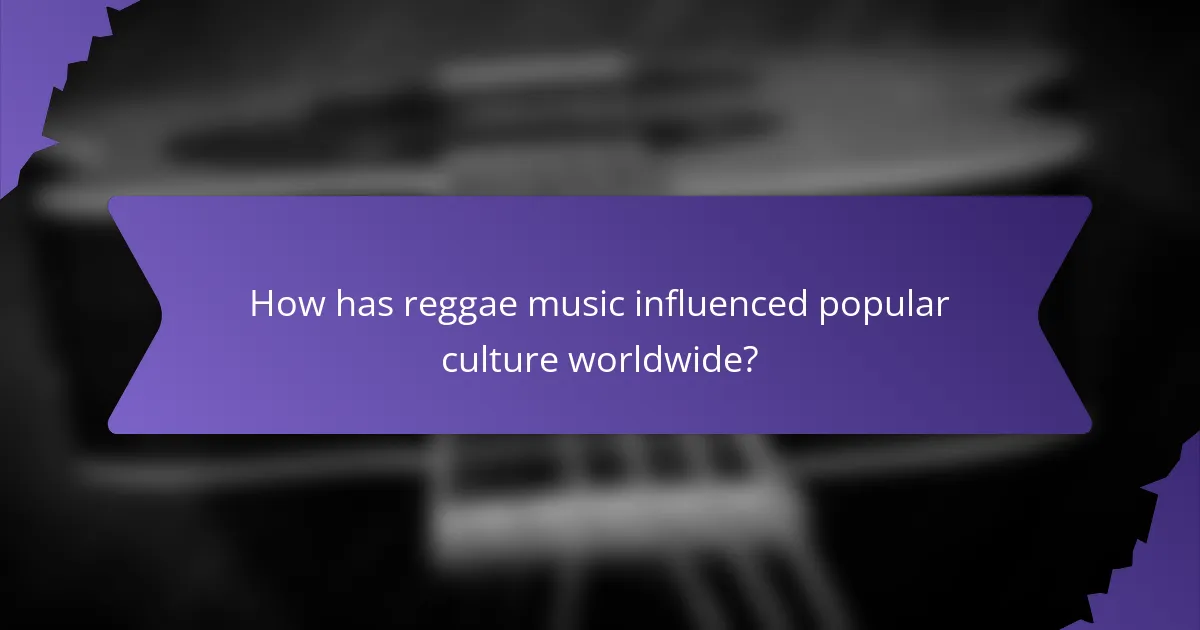
How has reggae music influenced popular culture worldwide?
Reggae music has profoundly influenced popular culture worldwide by promoting messages of social justice, unity, and love. Originating in Jamaica in the late 1960s, reggae’s rhythmic beats and distinctive sound have inspired various genres, including pop, rock, and hip-hop.
The global spread of reggae can be attributed to artists like Bob Marley, whose music transcended borders and resonated with diverse audiences. His songs often addressed themes like resistance and empowerment, making reggae a voice for marginalized communities.
Reggae festivals around the world celebrate this genre, fostering cultural exchange and appreciation. Countries such as the United States, Brazil, and the UK have embraced reggae, integrating its elements into local music scenes and styles.
Moreover, reggae’s visual culture, characterized by vibrant colors and Rastafarian symbolism, has influenced fashion and art, creating a unique aesthetic that continues to inspire creatives globally.
What impact did reggae have on the music industry in the 1970s?
Reggae significantly influenced the music industry in the 1970s by introducing new rhythms and social themes. It promoted messages of unity and resistance, impacting genres like rock and pop. Artists such as Bob Marley popularized reggae globally, leading to crossover hits and collaborations. The genre’s emphasis on political and social issues reshaped lyrical content across various music styles.
How is reggae represented in film and literature?
Reggae is represented in film and literature through its themes of resistance, identity, and social justice. Films like “The Harder They Come” highlight reggae’s roots in Jamaican culture and its global influence. Literature often explores the genre’s connection to Rastafarian beliefs and its role in political movements. Unique attributes of reggae, such as its rhythm and lyrical depth, resonate in storytelling, enriching narratives with cultural significance. Overall, reggae’s portrayal in these mediums emphasizes its lasting impact on society and art.
Which artists have integrated reggae into other music genres?
Numerous artists have successfully integrated reggae into various music genres, enhancing its global appeal. Notable examples include The Police, who blended reggae with rock, and UB40, known for their fusion of reggae and pop. Other influential artists include Eric Clapton, who infused reggae into blues, and Sean Paul, who incorporated reggae elements into hip-hop and dancehall. This cross-genre experimentation has expanded reggae’s cultural impact and reach worldwide.
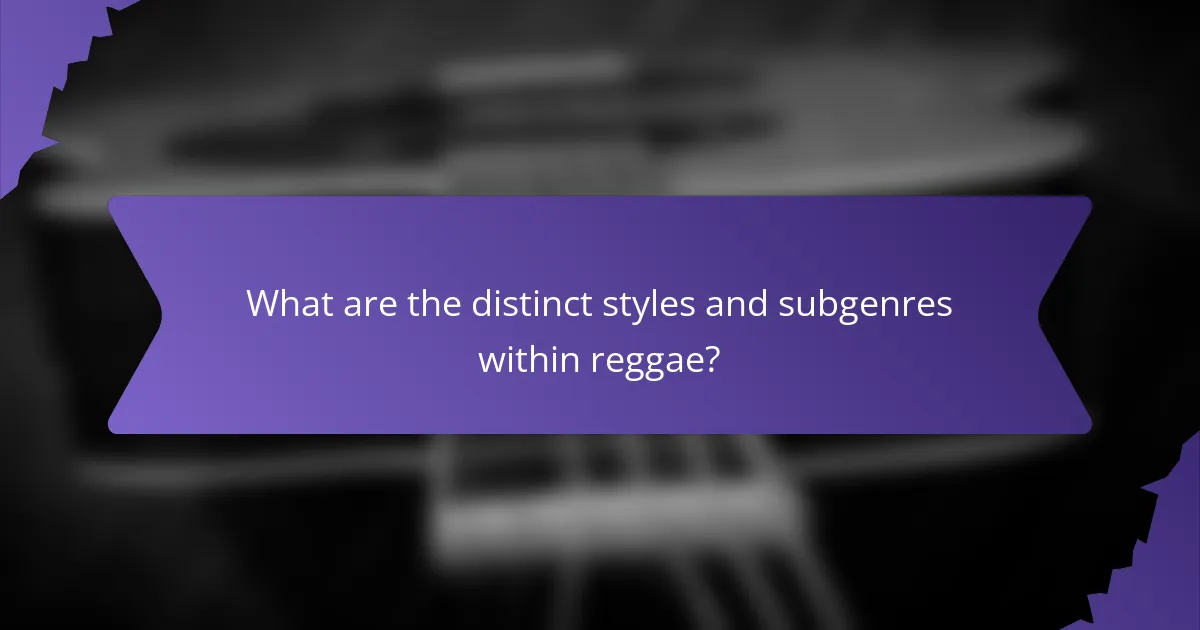
What are the distinct styles and subgenres within reggae?
Reggae encompasses several distinct styles and subgenres, each with unique characteristics. Prominent subgenres include roots reggae, known for its spiritual themes; dancehall, which features a faster tempo and electronic influences; and dub, characterized by heavy use of reverb and effects. Other styles like ska and rocksteady also contribute to reggae’s diverse soundscape. Each subgenre reflects different cultural and historical influences, showcasing reggae’s evolution over time.
Which characteristics define roots reggae compared to dancehall?
Roots reggae emphasizes live instrumentation and spiritual themes, while dancehall focuses on electronic production and party-oriented lyrics. Roots reggae often features slower tempos and socially conscious messages, highlighting cultural and political issues. In contrast, dancehall showcases faster beats and a more rhythmic vocal style, appealing to a younger audience. The unique attribute of roots reggae is its connection to Rastafarian culture, while dancehall’s rare attribute includes its evolution from Jamaican sound system culture.
How does reggae fusion differ from traditional reggae?
Reggae fusion incorporates various musical genres, while traditional reggae maintains a distinct style rooted in Jamaican culture. Reggae fusion blends elements like rock, hip-hop, and jazz, creating a more diverse sound. Traditional reggae focuses on rhythmic guitar, bass lines, and socially conscious lyrics. The cultural impact of reggae fusion extends globally, attracting a wider audience compared to the more localized appeal of traditional reggae. This evolution reflects the unique attribute of reggae fusion, which adapts to contemporary musical trends while honoring its historical roots.
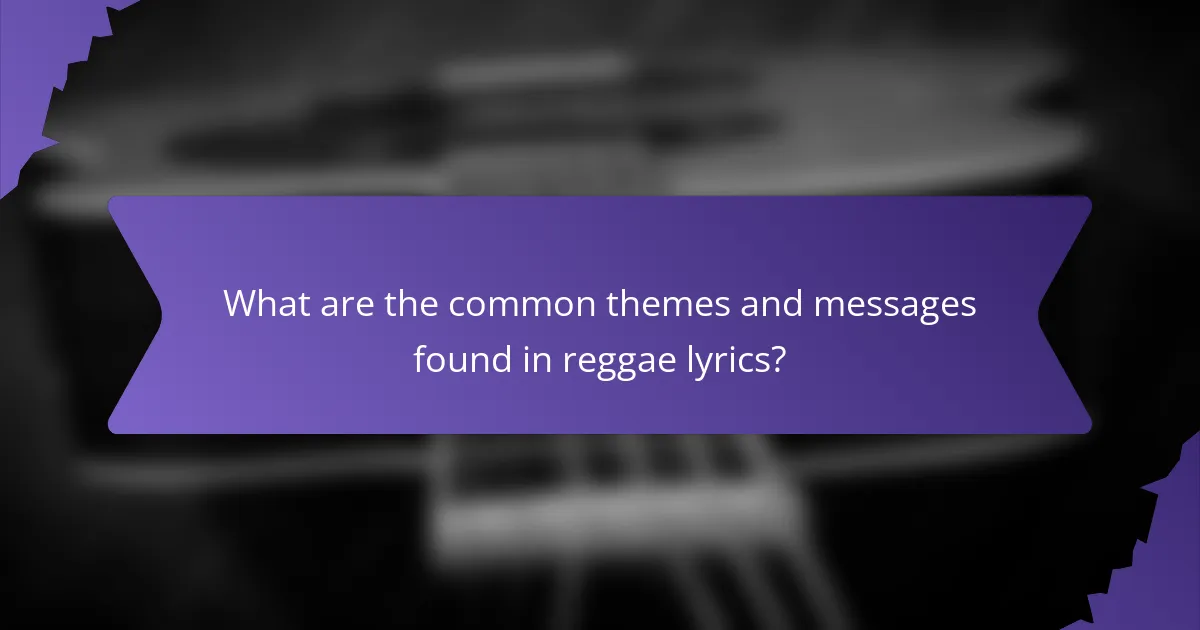
What are the common themes and messages found in reggae lyrics?
Reggae lyrics commonly convey themes of social justice, love, resilience, and cultural pride. These messages reflect the struggles and aspirations of marginalized communities, emphasizing unity and resistance against oppression. The genre often incorporates spiritual elements, promoting peace and harmony. Additionally, reggae frequently highlights the importance of heritage and identity, celebrating roots and traditions.
How do reggae songs address social justice and inequality?
Reggae songs profoundly address social justice and inequality through their lyrics and themes. They often highlight struggles against oppression, poverty, and systemic injustice.
Artists like Bob Marley and Peter Tosh used their music to advocate for civil rights and social change. Songs such as “Get Up, Stand Up” and “Equal Rights” explicitly call for action against inequality.
The genre’s roots in the Rastafarian movement further emphasize themes of empowerment and resistance. Reggae’s global influence has inspired movements for social justice worldwide, making it a powerful tool for raising awareness.
Through rhythmic melodies and poignant messages, reggae continues to resonate with audiences, fostering solidarity and encouraging activism.
What role does spirituality play in reggae music?
Spirituality plays a crucial role in reggae music, serving as its foundation and driving force. Reggae often reflects themes of love, unity, and social justice, deeply rooted in Rastafarian beliefs. This connection to spirituality enhances the genre’s emotional resonance and cultural significance. Artists like Bob Marley infused their music with messages of hope and liberation, shaping reggae’s global identity. The spiritual dimension fosters a sense of community and connection among listeners, making reggae not just a musical genre but a movement.
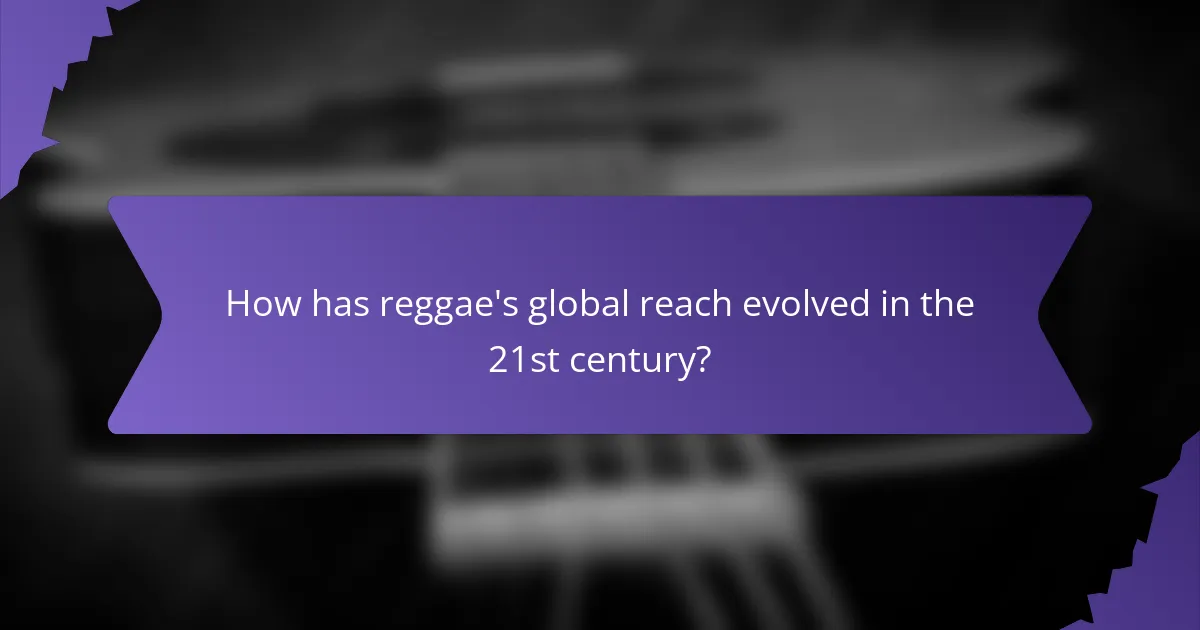
How has reggae’s global reach evolved in the 21st century?
Reggae’s global reach has expanded significantly in the 21st century, marked by increased international collaborations and diverse musical fusions. The genre has influenced various music styles worldwide, including hip-hop and pop. Streaming platforms have facilitated access to reggae music, allowing artists to reach broader audiences. Cultural festivals dedicated to reggae have proliferated, showcasing its enduring appeal and relevance across different cultures. Additionally, reggae’s messages of social justice and unity resonate globally, reinforcing its impact beyond music.
What trends are emerging in contemporary reggae music?
Emerging trends in contemporary reggae music include fusion with genres like hip-hop and electronic music, increased use of digital platforms, and a focus on social and political themes. Artists are experimenting with innovative sounds while maintaining reggae’s core messages. The global reach of reggae is expanding, with influences seen in various cultures and regions. Collaborations across genres are becoming more common, reflecting a blend of traditional and modern influences.
Which countries have adopted reggae and made it their own?
Countries that have adopted reggae and made it their own include Jamaica, the United States, the United Kingdom, Brazil, and South Africa. Each of these nations has infused reggae with local cultural elements, creating unique interpretations.
Jamaica is the birthplace of reggae, deeply rooted in its social and political history. The United States has popularized reggae through fusion genres, influencing mainstream music. The United Kingdom embraced reggae in the 1970s, leading to the development of styles like dub and ska. Brazil’s vibrant music scene has integrated reggae, resulting in a distinct sound known as reggae rock. South Africa has also adopted reggae, using it as a vehicle for social change and cultural expression.
These countries illustrate reggae’s global influence, showcasing its adaptability and enduring appeal across diverse cultures.
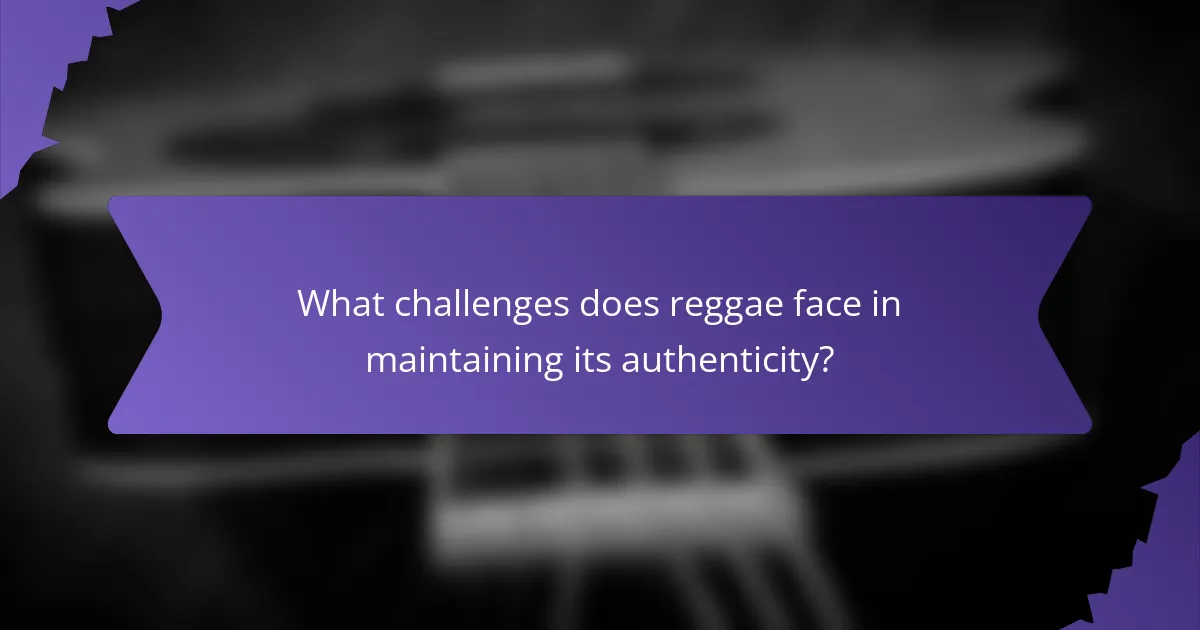
What challenges does reggae face in maintaining its authenticity?
Reggae faces challenges in maintaining authenticity due to commercialization, cultural appropriation, and evolving musical influences. These factors dilute its original messages and roots. Commercial success often prioritizes marketability over genuine expression, leading to a loss of cultural significance. Additionally, as reggae spreads globally, diverse interpretations emerge, sometimes straying from its foundational values. The unique attribute of reggae’s spiritual and social messages can be overshadowed by trends, risking its integrity.
How does commercialization impact reggae’s cultural significance?
Commercialization has diluted reggae’s cultural significance by prioritizing profit over authenticity. As reggae music enters mainstream markets, its messages of resistance and social justice often become overshadowed by commercial interests. This shift can lead to a loss of the genre’s roots, as artists may alter their sound to appeal to broader audiences. Additionally, the commercialization of reggae can commodify cultural symbols, reducing them to mere trends rather than respecting their historical context and meaning. The unique attributes of reggae, such as its spiritual and political messages, risk being overshadowed by a focus on mass consumption.
What are the concerns regarding cultural appropriation in reggae?
Concerns regarding cultural appropriation in reggae include the commercialization of the genre, misrepresentation of its roots, and the erasure of its cultural significance. Reggae originated in Jamaica and embodies the struggles and triumphs of its people. When artists outside this culture adopt reggae, they may dilute its message and overlook its historical context. This raises ethical questions about ownership and respect for the original culture. Additionally, the financial benefits often favor non-Jamaican artists, leading to economic disparities. Addressing these concerns requires a deeper understanding of reggae’s cultural heritage and promoting authentic representation.
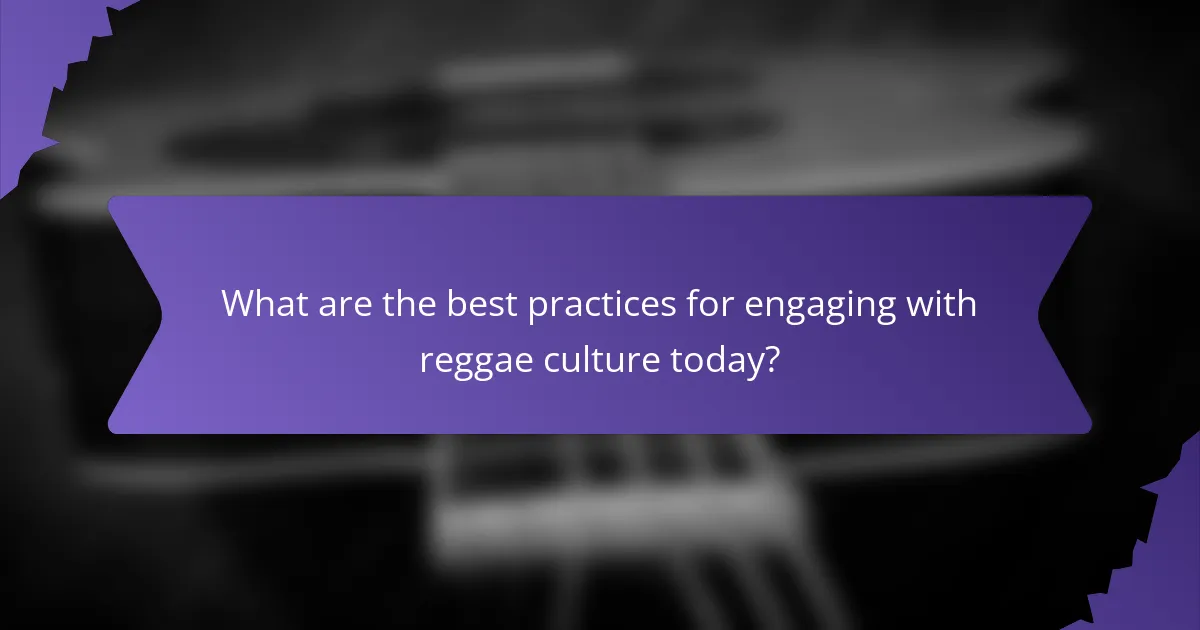
What are the best practices for engaging with reggae culture today?
Engaging with reggae culture today involves embracing its rich history and social messages. Participate in local reggae events, support reggae artists, and educate others about its roots.
1. Attend reggae festivals to experience live performances and connect with the community.
2. Explore reggae music through streaming platforms to discover both classic and contemporary artists.
3. Share reggae’s cultural significance on social media to raise awareness.
4. Support businesses that promote reggae culture, such as record stores and clothing brands.
5. Participate in discussions about reggae’s influence on social justice and activism.
How can listeners support authentic reggae artists and communities?
Listeners can support authentic reggae artists and communities by engaging directly with their music and culture. Purchasing music and merchandise directly from artists ensures they receive fair compensation. Attending live performances fosters community connections and promotes local venues. Sharing their work through social media amplifies their reach and visibility. Supporting reggae festivals and events helps sustain cultural traditions and provides platforms for emerging artists. Engaging with reggae music through education and awareness can also deepen appreciation and understanding of its historical roots and cultural significance.
What should newcomers know about reggae’s cultural context and significance?
Newcomers should understand that reggae music is deeply rooted in Jamaican history and culture, reflecting social issues and resistance. It emerged in the late 1960s, influenced by ska and rocksteady. Reggae promotes messages of peace, love, and unity, resonating globally. Its unique attributes include the use of offbeat rhythms and socially conscious lyrics, which differentiate it from other genres. The cultural significance of reggae encompasses its role in the Rastafari movement, advocating for social justice and equality.